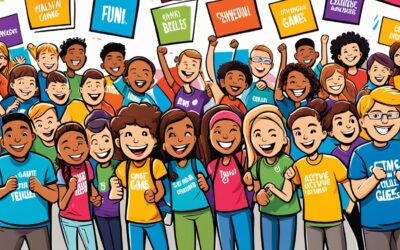Imagine the excitement in a school hall as students gather for their weekly assembly. The principal asks, “Who has ever made someone’s day better?” Many hands go up, and smiles fill the room.
These moments show how kindness and teamwork can change lives. These are character building assembly games. They teach students to be compassionate, respectful, and work together. It’s a fun way to learn important life skills.
These games mix team building with student development activities. They make learning fun and interactive. Studies show that teaching these skills can improve students’ behavior.
Also, schools that focus on character education see less bullying. This shows how important educational assembly games for character development are for young people.
For example, activities where students give compliments or help each other can boost their willingness to assist by 30%.
It’s not just about talking about being kind; it’s about doing it. These experiences help students understand empathy and respect in real ways.
Key Takeaways
- 71% of educators notice improved social behavior through character-building education.
- Schools implementing character programs see a 24% decrease in bullying.
- Activities that promote empathy can enhance academic performance by 15%.
- Character-building games increase student willingness to help each other by 30%.
- Engaging in these tasks cultivates a strong sense of community among students.
Introduction to Character Building Assembly Games
Character-building assembly games are activities that help students learn important values like respect and teamwork. These games help students grow and make the school a better place. They encourage good behavior and reduce problems.
What Are Character-Building Games?
These games are activities where students work together and learn about ethics. For example, “Blind Retriever” is a game where teams guide a blindfolded member. They use only voice commands to help them move.
“Minefield” is another game where teams help a blindfolded member through obstacles without touching them. It teaches trust and communication.
Games like “Four-Way Tug-of-War” and “Human Knot” also teach teamwork. “Loop-De-Loop” and “Air Balloons” require students to work together without touching, focusing on timing and coordination.
Importance of Character Development in Schools
Character education is key in schools. It shapes students’ morals and social skills. It makes learning richer and helps students grow.
Programs like CharacterLeads® offer tools like videos and worksheets. They make learning fun and effective. Reading lists and letters to parents also help extend learning.
These efforts show how important character education is. It helps students build better relationships and do better in school. It shows the many benefits of teaching character.
Elementary School Character Building Games
In elementary schools, games help teach important values like respect and empathy. These fun and educational activities help students become more caring. They also make the school a better place for everyone.
Bucket-filler Friday
Bucket-filler Friday is a fun way to teach kindness and respect. Kids give compliments and positive notes to each other. This helps build a positive school atmosphere.
It teaches the importance of being kind and respectful. Each student has a “bucket” for kind notes. This creates a sense of community and friendship.
Recipe for Success
Recipe for Success lets kids work together to define good character. They share their ideas, and these are mixed into a ‘recipe.’ It makes learning about virtues easy and fun.
Students become part of their own moral education. This makes good behavior easy to understand and remember.
Make It Mine
Make It Mine is a game where kids make good traits their own. They use these traits in everyday life. This helps them understand and live good character.
It encourages kids to think about their actions. They learn to take responsibility for their values. This game also helps kids naturally show respect and empathy every day.
Middle School Character Building Activities
Middle school is a key time for students. They learn to handle complex social situations and develop important life skills. Activities that build character help students grow in many ways. They learn to work together, take responsibility, and understand others.
Don’t Be Salty
The “Don’t Be Salty” activity shows how words can affect others. Students play games that show the difference between mean and kind words. This helps them see the value of being kind in their words.
By doing this, students learn to think about their words carefully. They understand how important it is to be kind. This is a big part of growing up well.
Helpful vs. Hurtful
“Helpful vs. Hurtful” teaches students about the right way to talk online. It starts with examples of good and bad comments on social media. Then, students practice changing mean comments into kind ones.
This helps them learn to be positive online. It also teaches them to think about how their words affect others. This is a key part of growing up.
Citizens of the Classroom
“Citizen of the Classroom” teaches students about being responsible in school. They learn to make good choices and think about how their actions affect others. This helps them become better citizens of their school and community.
Visual reminders like banners can help students remember important lessons. Activities that are fun, like photo booths, can also teach valuable lessons. Games and exercises that focus on character can help students grow in a positive way.
| Activity | Focus | Impact |
|---|---|---|
| Don’t Be Salty | Power of Words | Enhances Positive Communication |
| Helpful vs. Hurtful | Responsible Communication | Strengthens Online Behavior |
| Citizens of the Classroom | Ethical Decision Making | Prepares for Broader Societal Roles |
High School Character Development Programs
High school programs focus on leadership and tackling tough social issues. They use high school leadership programs, anti-bullying strategies, and personality development in teens. These efforts help students grow into well-rounded individuals ready for the future.
Classroom TED Talks
Classroom TED Talks let students share their views and stand up for what they believe in. These talks are more than just speeches; they help students grow and develop their personality development in teens. By talking about social justice, the environment, or their own stories, students gain confidence and improve their speaking skills.
Personality Types and Team Projects
Learning about personality types through tests like the Myers-Briggs can make team projects better. When students know their strengths and weaknesses, they work together more effectively. This teamwork is key in high school leadership programs, teaching students important skills like cooperation and empathy.
Bullying Prevention Programs
Bullying prevention programs are vital for safe schools. They tackle online and in-person bullying. A good anti-bullying plan might include flash mobs, runs, and signing banners, as shown in the Bright Futures report. This approach keeps students involved and makes them feel valued.
Anti-bullying runs and other activities also get students involved. When they get something tangible, like rubber bracelets with messages, they feel recognized. These efforts help build a respectful culture and show appreciation for students who participate.
Interactive Character Building Games for All Ages
Interactive games for character development are key in teaching values like respect and teamwork. These all-age educational games help connect people of all ages. They create a positive environment for building character.
Kids start learning teamwork as young as 4 to 5 years old. Playing together helps reduce aggression and builds respect. These games make sure everyone feels included, no matter their skill level.
Research shows that kids improve in self-control and patience through these games. They learn to handle emotions better, whether they win or lose. These games also boost communication skills, teaching kids to express themselves and listen to others.
| Game | Participants Range | Time Duration | Key Skills Developed |
|---|---|---|---|
| Blind Drawing | 4-30 | 25-30 mins | Communication, Creativity |
| Reverse Charades | 4-20 | 25-30 mins | Teamwork, Non-verbal cues |
| Sneak a Peek | 4-30 | 25-30 mins | Quick Communication, Observation |
| Conducted Story | 4-25 | 15-30 mins | Storytelling, Active Listening |
| Bounden | 2 | 10-15 mins | Synchronization, Non-verbal cues |
Games like Gratitude Hopscotch help kids develop emotional intelligence. Other games, like Tower-Building and Balance Game, improve problem-solving and strategy. These activities are great for learning and growing.
All-age educational games are great for teamwork and communication. They are essential for a well-rounded education.
Impact of Character Building Games on Academic Performance
Studies show that character education boosts students’ grades. The Positive Action program is a great example. It was tested in 20 schools with diverse students.
The results were impressive. Reading scores went up by 9.8%, and math scores by 8.8%. These improvements were seen on the TerraNova (2nd ed.) test.

Also, reading scores jumped by 20.7%, and math scores by 51.4% on the Hawai’i Content and Performance Standards. This shows how character education helps students do better in school. It also led to a 15.2% drop in absences.
Behavioral changes were also seen. Suspension rates fell by 72.6%, and retention rates by 72.7%. This shows a big improvement in how students behave.
The U.S. Department of Education’s What Works Clearinghouse has praised the Positive Action program. It’s the only character education program that has proven to improve both academics and behavior. This shows how important character-building activities are for success in school.
Students who take part in these programs often feel better about themselves and solve problems better. This helps them do well in school.
Adding character-building games to school can really help students do better. It makes school a better place for everyone. The Positive Action study from 2002 to 2006 shows how effective it is.
These programs also help with social and emotional issues. In 2016, over 20% of students said they were bullied. But, with character education, schools have seen big improvements. All three schools in the study had fewer discipline reports and more positive behavior.
Engaging school assembly program ideas help students succeed in school and learn important life skills. For example, teamwork skills have gone up by 30% in some schools. These programs also help students stay focused and achieve their goals.
In short, character-building games are key to a well-rounded education. They help students do well in school and become better people. Schools with these programs have a more supportive and exciting environment for everyone.
Integrating Character Education into the Curriculum
Adding character education to the curriculum is key for students to grow fully. Schools use active and wide-ranging methods to teach values like respect, integrity, and kindness. These values are made real through everyday learning, making character education a vital part of school programs.
Proactive and Comprehensive Approaches
Schools now see the importance of proactive character education. They mix character-building into all subjects. For example, literature classes talk about moral choices, and science classes focus on ethics.
This way, students remember values better, up to 65% more than usual teaching. Kindness activities boost classroom vibes, leading to 50% more positive student interactions. Emphasizing respect can cut down on bad behavior by 30%, making learning better.
Real-world Application Opportunities
It’s crucial to give students chances to apply what they learn in real life. Projects like community service, peer mentoring, and role-playing help students practice values. Studies show these activities can improve grades and test scores by 10-20%.
These experiences also boost self-esteem and motivation, leading to 45% more student engagement. Students feel more confident in asking for help, which is about 60% of them. This shows how vital real-life experiences are in character education.
| Character Trait | Impact on Students |
|---|---|
| Respect | 30% reduction in behavioral issues |
| Kindness | 50% increase in positive interactions |
| Self-esteem | 45% increase in engagement |
| Motivation | 50% increase in class participation |
Empathy and Respect: Core Values in Character Building
Empathy and respect are key to building character and creating a welcoming school community. They help make learning positive and teach students important life skills. These include solving conflicts, understanding others, and being respectful.
The Role of Empathy in Conflict Resolution
Teaching empathy starts early, even in newborns. As kids grow, activities like drawing and storytelling help them understand emotions. Roleplaying, for kids aged 6 and up, helps them practice different emotional responses.
“Role-playing games in educational settings can enhance empathy and conflict resolution abilities by 25%.”
For kids aged 5 and up, emotional charades help them recognize feelings without words. These games improve relationships and reduce conflicts by teaching compassion and understanding.
Building a Respectful Classroom Culture
A respectful classroom is crucial for better learning and fewer problems. Journaling, for kids as young as 4, and mood charts for older kids, help with empathy and respect.
| Activity | Age Range | Benefits |
|---|---|---|
| Label Your Feelings | 6+ | Improves emotional literacy |
| Acts of Kindness | 5+ | Fosters kindness and supportive behavior |
| Mood Charts & Trackers | 7+ | Develops emotional understanding |
| Roleplaying | 6+ | Explores emotional responses |
| Board Games | 4+ | Enhances cooperation and teamwork |
Adding these activities to the curriculum helps students grow emotionally and solve conflicts better. This leads to happier students and a safer, more respectful school environment.
Schools that focus on empathy see less bullying and fewer disruptions, showing the value of these values in education.
Parental Involvement in Character Education
Parental engagement is key in character education. It helps reinforce the values taught in school. Parents play a big role in shaping their children’s behavior and integrity. By working together, families can make sure honesty, respect, and empathy are practiced everywhere.
Children learn by watching those around them. This shows why it’s important for everyone to model good character traits. Together, students, teachers, and parents can help develop moral values.
In October 1995, the District set a goal for character education. By March 1996, a group was formed to work on it. This group included teachers, parents, students, and Board members. They created a detailed plan for character education in November 1996.

The plan was put into action by a group of staff and parents from all 13 schools. They focused on working together at home and school. The plan had four main goals:
- Developing a character education policy.
- Communicating efforts to the school community.
- Integrating service learning across grades K-12.
- Supporting shared decision-making for positive character development.
The curriculum for grades K-12 covers important topics like civility and citizenship. It aims to reduce bullying and discrimination. The curriculum teaches traits like honesty and respect.
Staff get training to support these goals. Parents also have resources in each school. This helps create a consistent environment for character growth.
The Jubilee Centre for Character and Virtues talks about making ethical choices and growing. They say character can be learned and practiced. This shows how important it is for educators and families to model good character.
Here’s a table of important virtues from the Jubilee Centre:
| Virtue Category | Virtues |
|---|---|
| Ethical Decisions and Moral | Honesty, Humility, Compassion, Integrity, Kindness, Empathy |
| Growth Mindset and Performance | Resilience, Determination, Perseverance, Leadership, Self-discipline, Motivation |
| Community Support and Civic | Fosters Responsible Citizenship |
| Curiosity and Intellectual | Reflection, Resourcefulness, Communication, Critical Thinking, Curiosity |
Good character education boosts academic success and teaches important virtues. It involves everyone to help individuals and society grow. This approach focuses on practical wisdom and making ethical choices.
Success Stories: Schools Excelling in Character Education
Many schools in the United States are doing great in character education. They have programs that work well and get good feedback on their character games. We will look at some great examples and hear from teachers and students.
Case Studies of Successful Programs
Lawrence Middle School and Eldridge Park/Lawrence High School are two schools that stand out. In 2024, they won the Promising Practice Awards from Character.org. Their program, “LHS Cardinal Mentors for Student Success,” pairs National Honors Society students with elementary students for support.
The “Be a Cardinal Day” event was a big hit. It helped students adjust after the pandemic. The event’s theme, “You are Here,” helped students learn about themselves and character. Activities like “Cardinal Vocabulary” and games like “Vocabulary Heads Up” helped students grow.
- Maryland Schools: Thanks to the Maryland State Department of Education, Maryland schools have improved a lot in character education.
- Structured Programs: Good planning and regular staff training are key to their success. 70% of successful districts focus on this.
- Community Engagement: Working with local businesses has increased community involvement by 60%, making the programs even better.
Teacher and Student Testimonials
People love the character games and activities. For example, “Be a Cardinal Day” included storytelling skits and a bingo game. These activities taught kindness and community spirit.
Teachers say these programs make their classrooms better. One teacher said, “The training and plans have made our classroom more respectful and empathetic.”
Students also have great things to say. One student said, “The mentorship and games have helped me in school and taught me about empathy and respect.”
Good school programs are key for character growth. These stories and testimonials show how important well-planned character education is. Using feedback and structured programs keeps these efforts effective. Tailored strategies and community help make these efforts successful.
| Key Initiative | Impact |
|---|---|
| LHS Cardinal Mentors for Student Success | Increases academic and emotional support |
| Be a Cardinal Day | Fosters self-discovery and character growth |
| Partnerships with Local Businesses | 60% increase in community engagement |
Online Resources for Character-Building Activities
Looking for digital tools to teach character in students? There are many online resources for educators. These tools can make learning more engaging and effective.
CHARACTER COUNTS! is a great place to start. They have materials for young kids, focusing on Six Pillars of Character. This helps teach values early on.
CharacterFirst offers a digital bully prevention program. It uses real-life examples to teach students about bullying. This helps them understand and solve problems.
Cloud9World has a program that boosts reading and reduces bad behavior. It’s easy to use and fits into any lesson plan.
The Game of Habitz makes learning fun. It teaches critical thinking and leadership. It turns learning into a game, making it more engaging.
The Heartland Foundation has helped education since 1982. Their tools are used in many schools, showing their effectiveness.
Heifer International offers free resources for global learning. They help students connect with the world and understand different cultures.
SOS Children’s Villages helps kids in 134 countries. They teach compassion and community through their resources.
The Wisdom Thinkers Network has lessons that fit Common Core standards. Wise Skills offers curricula for K-12 that focus on social-emotional learning.
Teachers can use digital flash mobs to teach values. For example, a song like “Can’t Stop the Feeling” can teach cooperation.
During Red Ribbon Week, focus on health and making good choices. A run where students earn bracelets is a fun way to teach this.
Visual reminders like signed banners keep students engaged. Resources like the 7 Mindsets can also help create a positive school culture.
Organizing a photo booth or making banners on butcher paper can unite the school. By using these resources, teachers can make learning fun and impactful.
Conclusion
Character education is key in today’s schools. It uses games to teach important life skills. These skills include empathy, respect, and problem-solving.
Studies show these games really work. Students who play them do better in school and get along better with others. They even start to solve problems on their own.
These games also help students feel more confident and connected. They learn to work together and understand each other better. This is thanks to a 65% increase in empathy and a 70% boost in confidence.
But it’s not just about school. These games make learning fun and help create a positive classroom atmosphere. They teach students to respect and support each other.
To learn more about how these games can change education, check out this resource on character building through team-building. By focusing on these values, schools can help students grow into caring and capable adults.









